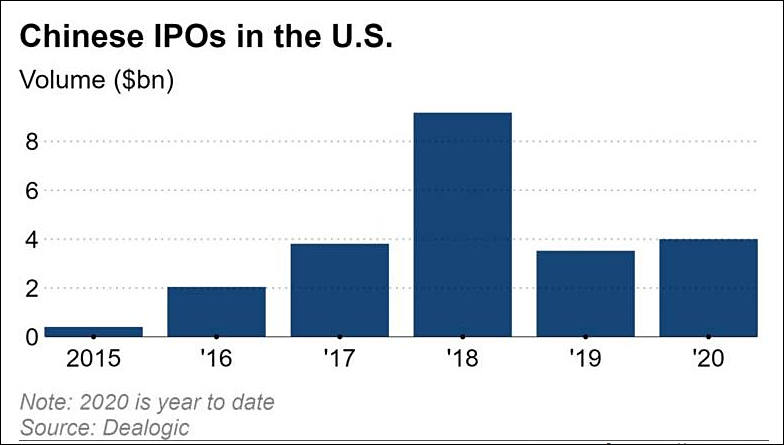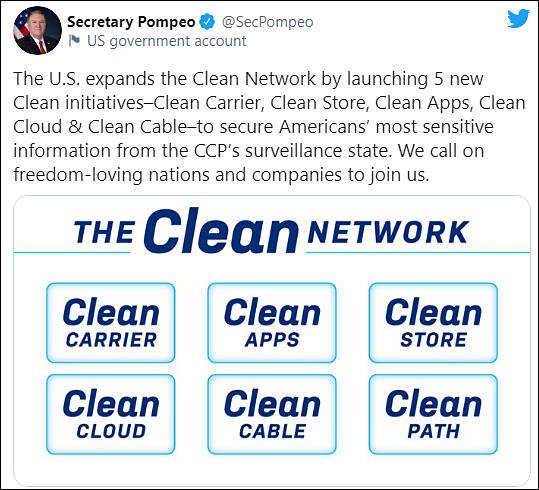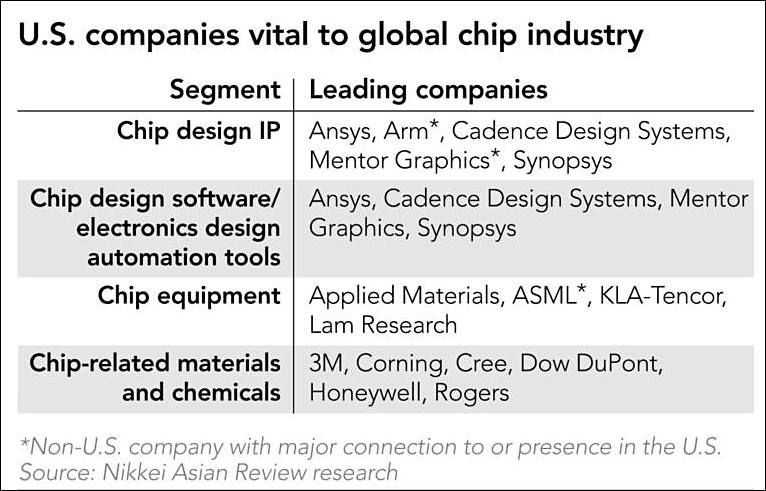
It allows to keep PV going, with more focus towards AI, but keeping be one of the few truly independent places.
-
The buy of arm the quit of apple the expropriation of Tik Tok the bought of melanox the increased power of nvidia, the corrupt Samsung with his whore wife apple.
Trump is doing some hell of a job.
-
China should prepare for potential U.S. sanctions by increasing use of its own financial messaging network for cross-border transactions in the mainland, Hong Kong and Macau, according to a report from the investment banking unit of Bank of China.
Chinese state lenders have been revamping contingency plans in anticipation of U.S. legislation that could penalise banks for serving officials who implement the new national security for Hong Kong, Reuters reported earlier this month.
Greater use of the Cross-Border Interbank Payment System (CIPS) instead of the Belgium based SWIFT system would also reduce exposure of China's global payments data to the United States, BOC International (BOCI) said in the report, which was co-authored by a former foreign exchange regulator.
The report looked at potential measures the United States could take against Chinese banks, including cutting off their access to the SWIFT financial messaging service, a primary network used by banks globally to make financial transactions.
"A good punch to the enemy will save yourself from hundreds of punches from your enemies," the report wrote, amid deteriorating relating between the world's two largest economies. "We need to get prepared in advance, mentally and practically."
China launched the CIPS clearing and settlement services system in 2015 to help internationalise use of the yuan. Supervised by the central bank, CIPS said it processed 135.7 billion yuan ($19.4 billion) a day in 2019, with participation from 96 countries and regions.
-
WSJ reports that a new proposal from the Trump Administration calls for all Chinese-domiciled companies with shares listed on American stock exchanges will need to comply with American auditing rules, or de-list by 2022.
As far as I know it had been long planned and expected. Most Chinese companies are pulling out before any action.
-
ByteDance threatens to sue US government for TikTok treatment
In response to the US government's latest executive order, Beijing-based TikTok's parent company, ByteDance, today released a statement saying that it will take to US court if the US government fails to treat TikTok fairly.According to the statement, the "reports" cited in the executive order are of unknown or unverified origin, and concerns that the app "may" be used for false advertising have no basis in fact. "We have made it clear that TikTok has never shared user data with the Chinese government and has never reviewed content upon request," the statement said. "In fact, we have made our review policy and algorithm source code public by establishing the Transparency Center, and no comparable technology company has yet committed to such a responsibility," it added.
This executive order would undermine global businesses' trust in America's commitment to the rule of law. It is what has attracted foreign investment and fueled US economic growth for decades. This order sets a dangerous precedent that runs counter to freedom of expression and open markets.We will vigorously pursue all available measures to ensure that the rule of law is not abandoned and that our companies and our customers are treated fairly.If the US government does not treat us fairly, we will take our case to the US courts.For the 100 million US users who call TikTok their home for self-expression, entertainment, and connection, we want them to know that TikTok has never, and will never, waver from our commitment. User safety and community trust have always been our top priority.https://cntechpost.com/2020/08/07/bytedance-threatens-to-sue-us-government-for-tiktok-treatment/
-
ByteDance's lawsuit does not have a chance against the murky claims of national security. I am not an expert on Constitutional laws, but if US TikTok users band together in a class action lawsuit on infringement of their freedom of speech, that stands a much better chance, especially when there are 100M claimants. This is also an election year, I do not know how many users are eligible to vote in 2020, but as a voting block, they no doubt will carry substantial weights as long as they stand together. Given how the relationship between US and China has fallen of a cliff, beware of the Guns of August, war may not be that far away. Once the ball rolls down a slope, it is near impossible to crawl out of it.
-
Canada rewarded for not extraditing Huawei executive fast enough?
NEW TARIFFS: Canada to retaliate 'dollar for dollar' after U.S. slaps 10% tariff on aluminum
"Canadian aluminum does not undermine U.S. national security. Canadian aluminum strengthens U.S. national security and has done so for decades through unparalleled co-operation between our two countries," she said. Trudeau said, "We will always stand up for our aluminum workers. We did so in 2018, and we will stand up for them again now." -
The revolution is like a bicycle. When the wheels don't turn, it falls.
Marjane Satrapi
Just note that reaction is absolutely same - it needs to go further to stay alive.
So as people now pray that present trade war will stop and delay on present phase - it can't be done. Either it'll go into full blown world war or present reactionary politics of ruling class and ruling clas by itself will fall.
-
For China it is now extremely important to stall Taiwan economy.
Best way can be to induce total air and sea blockade. With China hlep to supply necessary food and basic goods, but thing for high tech industry. As it is necessary to wipe all high tech out.
-

Lot of small Chinese firms in US are similar to advanced scam (same as many US startups), where ti is lot of loud words and never anythign real.

 sa14039.jpg784 x 445 - 37K
sa14039.jpg784 x 445 - 37K -

Funniest thing here is "Clean path". They preferred not to talk much about it.
But rumors are that it means US great firewall with deep pocket inspection (ala China). All of leading US providers had been actively buying DPI equipment during last years, so must be easy to make.

 sa14051.jpg539 x 490 - 69K
sa14051.jpg539 x 490 - 69K -
Chinese hackers this time
A presentation at the Black Hat (virtual) Security Conference this week revealed details of a number of hacking operations aimed at the Taiwanese semiconductor industry. The Taiwanese security firm CyCraft presented details of its investigation at the conference. At least seven Taiwanese companies were penetrated in an attack CyCraft refers to as “Operation Skeleton Key,” due to the use of a “skeleton key” injector technique. While CyCraft has nicknamed the group Chimera, there’s evidence of ties to mainland China and possibly to government-sponsored hacking groups.
“This is very much a state-based attack trying to manipulate Taiwan’s standing and power,” Chad Duffy, one of the CyCraft researchers who worked on the company’s long-running investigation, told Wired. The sort of wholesale theft of intellectual property CyCraft observed “fundamentally damages a corporation’s entire ability to do business,” adds Chung-Kuan Chen, another CyCraft researcher who will present the company’s research at Black Hat today. “It’s a strategic attack on the entire industry.”
Expect much more from US adn EU tech sites as most of them are tightly interleaved with governments.
-
No more Android updates
A U.S. reprieve that had allowed some trade with Huawei to continue has now lapsed, potentially complicating the operation of some rural telecommunications networks and Huawei cell phones.
The reprieve, which expired Thursday night, provided some exceptions to a trade ban the Trump administration imposed last year on the Chinese tech giant, which it labeled a security threat.
That ban generally prohibited U.S. companies from exporting technology to Huawei. But the reprieve, known as a temporary general license, allowed U.S. software providers to continue sending updates and patches to Huawei so the Chinese company could disseminate them to customers using Huawei cellphones or Huawei wireless network equipment.
The expiration of the license also means that Google won’t be able to send software updates to Huawei cell phones, which run on Google’s Android operating system.
-
More Chinese Imports than ever, but nothing going back.
China-U.S. West Coast container rates continue their astonishing climb. Not because of too little vessel supply, but because of too much import demand. U.S. import demand that is not surging despite of coronavirus, but because of it. “The trans-Pacific eastbound market is going crazy,” exclaimed Nerijus Poskus, vice president and global head of ocean freight at digital freight forwarder Flexport. Current dynamics are unprecedented, he said in an interview with FreightWaves on Wednesday.“All of us thought that because of the pandemic, consumption would go down,” he said. Instead, it has gone up — at least temporarily. “Our clients are selling more. They’re selling more online. And that’s why they’re shipping more into the U.S. Of the top 100 clients of Flexport, 80% of them are growing year-on-year and assumedly they’re gaining market share,” reported Poskus.“People are still buying. Even unemployed people. They’re getting government support so they still have money. They’re no longer spending on restaurants, haircuts, gas and commuting. But they have the cash so they’re just buying more things. And they’re buying more things online.China's Hubei launches regular air cargo route linking Wuhan with Dallas, Los Angeles
WUHAN, Aug. 16 (Xinhua) -- A new, scheduled air cargo route linking Wuhan, capital of central China's Hubei Province and U.S. cities of Dallas and Los Angeles, was launched on Sunday. An all-cargo flight carrying 110 tonnes of exported auto parts and electronic products took off at Wuhan Tianhe International Airport at 12:05 p.m. Sunday for Dallas.It is the third regular, intercontinental air cargo route opened by the airport, and the only all-cargo flight to Dallas in China. After arriving in Dallas, the aircraft will continue to fly to Los Angeles.Using a Boeing 747 freighter, three flights are scheduled to operate every week. The exported cargos, mainly consisting of electronic products, mechanical components and cross-border e-commerce commodities, are expected to be transported to major U.S. cities.The opening of the route will further enhance the airport's port functions, support Wuhan in building an air logistics hub as well as attract the global electronics industry to the city, according to the Hubei Airports Group.By the end of July, the Wuhan Tianhe International Airport had operated international air freight lines linking 30 destinations overseas, including Liege, Chicago, Manila and Singapore. -
Shares of Alibaba trading on the NYSE during Monday's premarket session slumped 120bps to $251 following President Trump's comments on Saturday about exerting more pressure on Chinese-owned companies.
and
Order by @CommerceGov further restricts access by @Huawei and its non-US affiliates on the Entity List to items produced domestically and abroad from American technology and software.
Commerce Department confirmed its plans to further tighten restrictions governing the company's access to chips made using American technology, even if these chips are produced by foreign firms. The company will also add 38 Huawei affiliates in 21 countries to the government's economic blacklist, the sources said, raising the total to 152 affiliates since Huawei was first added in May 2019.
-
Chinese firme are moving out of dollars
In past two weeks lot of big Chinese clients got noticesthat it is necessary to make new contracts to fully exclude dollars from payments.
It seems like dollar becoming dangerous currency.
I know few Chinese gear factories who stopped in last two months also using dollars in their product cost calculations and make conversion only at the last stage.
-
TIme to invade Taiwan coming
Taiwan is planning to lock out video streaming services from Chinese tech giants Baidu and Tencent. While such services are ostensibly already illegal in the self-governing island republic, Baidu’s iQiyi and Tencent’s WeTV currently operate under a legal loophole that allowed them to partner with local companies. Now, Taiwan’s Ministry of Economic Affairs says that Taiwanese companies won’t be able to provide these services as of September 3rd.
-
A Gartner, Inc. survey of 260 global supply chain leaders in February and March 2020 found that 33% had moved sourcing and manufacturing activities out of China or plan to do so in the next two to three years.
For decades, China has been the go-to destination for high-quality, low-cost manufacturing, and it has established itself as a key source of supply for almost all major industries including retail and pharmaceutical. However, Gartner research showed that the margin between those companies planning to add jobs in China versus taking them away narrowed sharply in 2019. The primary reason is the increase in tariff costs.
“We have found that tariffs imposed by the U.S. and Chinese governments during the past years have increased supply chain costs by up to 10% for more than 40% of organizations. For just over one-quarter of respondents, the impact has been even higher,”
-
TrendForce expect that Huawei smartphones production will drop to below 30 millions per year in 2021 from 190 millions in 2020. And it will be mostly cheap domestic Chinese smartphones that use simple processors and 3G or 4G modems. Most will cost below $150. So income drop can be staggering.
Later in the year it is expected that US also will throw out Xiaomi and BBK brands out of EU, Japan and Asia also.
Such way Chinese smartphones export could drop from 10 to 15 times total, while production will drop 7-10x times.
Up to 1300 domestic Chinese firms who supply components and other services will cease to exist.
-
Just a little setback in general movement
United States Trade Representative Robert Lighthizer and European Union Trade Commissioner Phil Hogan today announced agreement on a package of tariff reductions that will increase market access for hundreds of millions of dollars in U.S. and EU exports. These tariff reductions are the first U.S.-EU negotiated reductions in duties in more than two decades.
Under the agreement, the EU will eliminate tariffs on imports of U.S. live and frozen lobster products. U.S. exports of these products to the EU were over $111 million in 2017. The EU will eliminate these tariffs on a Most Favored Nation (MFN) basis, retroactive to begin August 1, 2020. The EU tariffs will be eliminated for a period of five years and the European Commission will promptly initiate procedures aimed at making the tariff changes permanent. The United States will reduce by 50% its tariff rates on certain products exported by the EU worth an average annual trade value of $160 million, including certain prepared meals, certain crystal glassware, surface preparations, propellant powders, cigarette lighters and lighter parts. The U.S. tariff reductions will also be made on an MFN basis and retroactive to begin August 1, 2020.
-
New step of U.S. - restricting chip equipment and other exports
The United States is considering new restrictions on exports of semiconductor manufacturing equipment and associated software tools, lasers, sensors, and other technology to prevent them from falling into the hands of U.S. adversaries like China.
The U.S. Commerce Department said in a posting on a government website on Wednesday it was seeking public input on how to define new technologies as it determines “whether there are specific foundational technologies that warrant more restrictive controls” in the export process.
The Trump administration said the emerging technologies could be used the militaries of adversaries such as “China, Russia or Venezuela.”
Last year the administration was finalizing a set of narrow rules to limit exports of products like quantum computing and 3-D printing technologies.
Trump is talking about MAGA, but step by step is destroying all US high tech industry.
-
Huawei has slowed down the pace of its orders to handset ODMs in China, as the impact of the latest US trade ban against the Chinese brand intensifies, according to sources at China-based handset ODMs.
Things are bad for Huawei and lot of other Chinese firms.
next attack round is rumored to be on Xiaomi and BBK brands (Oppo and Vivo).
Howdy, Stranger!
It looks like you're new here. If you want to get involved, click one of these buttons!
Categories
- Topics List23,979
- Blog5,725
- General and News1,352
- Hacks and Patches1,153
- ↳ Top Settings33
- ↳ Beginners255
- ↳ Archives402
- ↳ Hacks News and Development56
- Cameras2,362
- ↳ Panasonic991
- ↳ Canon118
- ↳ Sony156
- ↳ Nikon96
- ↳ Pentax and Samsung70
- ↳ Olympus and Fujifilm100
- ↳ Compacts and Camcorders300
- ↳ Smartphones for video97
- ↳ Pro Video Cameras191
- ↳ BlackMagic and other raw cameras116
- Skill1,961
- ↳ Business and distribution66
- ↳ Preparation, scripts and legal38
- ↳ Art149
- ↳ Import, Convert, Exporting291
- ↳ Editors191
- ↳ Effects and stunts115
- ↳ Color grading197
- ↳ Sound and Music280
- ↳ Lighting96
- ↳ Software and storage tips267
- Gear5,414
- ↳ Filters, Adapters, Matte boxes344
- ↳ Lenses1,579
- ↳ Follow focus and gears93
- ↳ Sound498
- ↳ Lighting gear314
- ↳ Camera movement230
- ↳ Gimbals and copters302
- ↳ Rigs and related stuff272
- ↳ Power solutions83
- ↳ Monitors and viewfinders339
- ↳ Tripods and fluid heads139
- ↳ Storage286
- ↳ Computers and studio gear560
- ↳ VR and 3D248
- Showcase1,859
- Marketplace2,834
- Offtopic1,319







